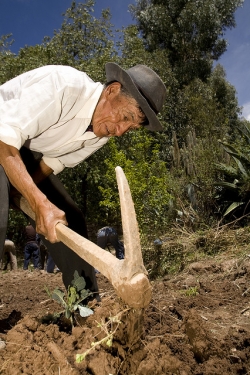 I am concerned that even though we can listen to the negotiations we can’t speak.
I am concerned that even though we can listen to the negotiations we can’t speak.
Despite this, the day was good as I went to the parallel Climate Day event where there was a session about participative planning and adaptation in Bolivia. Here I was able to participate and get our point of view across.
I also went to the Agriculture and Development day where there were some interesting round tables and a document was developed to take to the conference.
This was good as I was able to actively participate along with colleagues from different countries.
Traditional knowledge as important as technology
Even though the tone of the document is rather policy focused, we managed to include wording about local, traditional knowledge and small landholders’ and farmers’ rights in developing countries.
The wording does not explicitly mention older people. However, we managed to get over to others that the knowledge of our older people is as important as technology and the theory of the effects of climate change on vulnerable communities.
We also emphasised that this knowledge helps us understand why so many of our young people are migrating from agricultural areas to the city.
Tomorrow I will be at another event, Forest Day, where I will raise the older people’s issues and hopefully get a good response.
Find out more about HelpAge’s work on climate change
